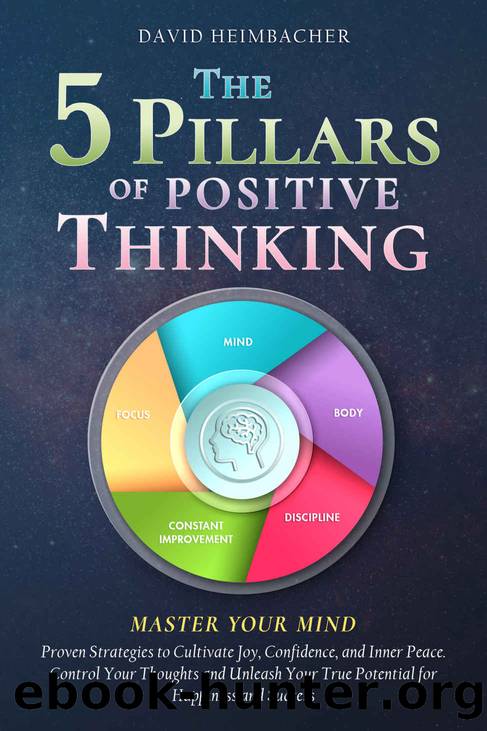The 5 Pillars of Positive Thinking â Master Your Mind: Proven Strategies to Cultivate Joy, Confidence, and Inner Peace. Control Your Thoughts and Unleash Your True Potential for by David Heimbacher

Author:David Heimbacher [Heimbacher, David]
Language: eng
Format: azw3
Published: 2023-05-23T00:00:00+00:00
Establish New Habits
Bad habits paralyze you, thereby keeping you trapped in structures that promote negative thinking patterns. Stress levels rise when there is increased television consumption, a poor sleep rhythm, lack of exercise, or the habit of agreeing to everything, thus burdening yourself with too much. You keep your mind locked up, full of negative energy, and give yourself little space for self-development. Of course, you can never live a life where you are never stressed again, but a balanced person can deal with the cause of stress in a much more calm and reflective way and no longer see it as a reason to do something bad. Consequently, you efficiently eliminate the problem or find a way to deal with it. Also, reflecting on the positive things in life and realizing how small the problem is compared to the beauty of life will help you put yourself back in a positive mood.
Move away from the thought of changing your entire life and way of thinking from one day to the next. Give yourself space and time, and take a calm approach toward self-improvement. Just changing one thing can make a big difference in how happy you are with your life. For example, the time you save by watching half as much TV could be better spent on a new habit. Simply set a timer for yourself or decide to watch a maximum of one movie in the evening after you have done everything you set out to do for that day.
But what exactly defines a bad habit? How can you tell that an activity is not good for you? In addition to simple and understandable factors such as diet and exercise, which were discussed in detail in the previous chapter, other activities can also be identified as a bad habit. This, like most everything else, depends on the person you are. While one person can draw boundaries and says that an hour in front of the TV is good for him because he can switch off for a moment, another person is hooked by television: he consumes it all and leaves no room for the essential things. In general, however, increased television consumption is seen as negative.
In addition to the many methods that help you integrate new habits, replacing a bad habit directly with a good one works wonders. When you suddenly stop following a routine, it can throw you back into a bad way of thinking and acting. Fix the problem yourself and find a suitable replacement that also meets your needs!
If you want to eliminate a habit, you must fight against your natural instincts. If you set a goal to spend less money on shopping, it will be difficult at first. It is much easier to respond to the thing that triggers the desire to buy with something else that gives you a rewarding feeling. The trigger and the reward usually remain the same as long as you know what needs you are satisfying with the habit. In some cases, the desire for new clothes goes hand in hand with the need to boost self-esteem.
Download
This site does not store any files on its server. We only index and link to content provided by other sites. Please contact the content providers to delete copyright contents if any and email us, we'll remove relevant links or contents immediately.
The Compound Effect by Darren Hardy(8949)
Wonder by R.J. Palacio(8572)
Atomic Habits: Tiny Changes, Remarkable Results by James Clear(8327)
Becoming Supernatural by Dr. Joe Dispenza(8204)
Wonder by R. J. Palacio(8099)
Change Your Questions, Change Your Life by Marilee Adams(7762)
The Road Less Traveled by M. Scott Peck(7594)
Born to Run: by Christopher McDougall(7121)
Daring Greatly by Brene Brown(6504)
Big Magic: Creative Living Beyond Fear by Elizabeth Gilbert(5757)
Grit by Angela Duckworth(5605)
The Slight Edge by Jeff Olson(5410)
Men In Love by Nancy Friday(5234)
The Wisdom of Sundays by Oprah Winfrey(5153)
You Are a Badass at Making Money by Jen Sincero(4925)
Fear by Osho(4728)
The Miracle Morning by Hal Elrod(4716)
The Four Tendencies by Gretchen Rubin(4595)
Rising Strong by Brene Brown(4451)
